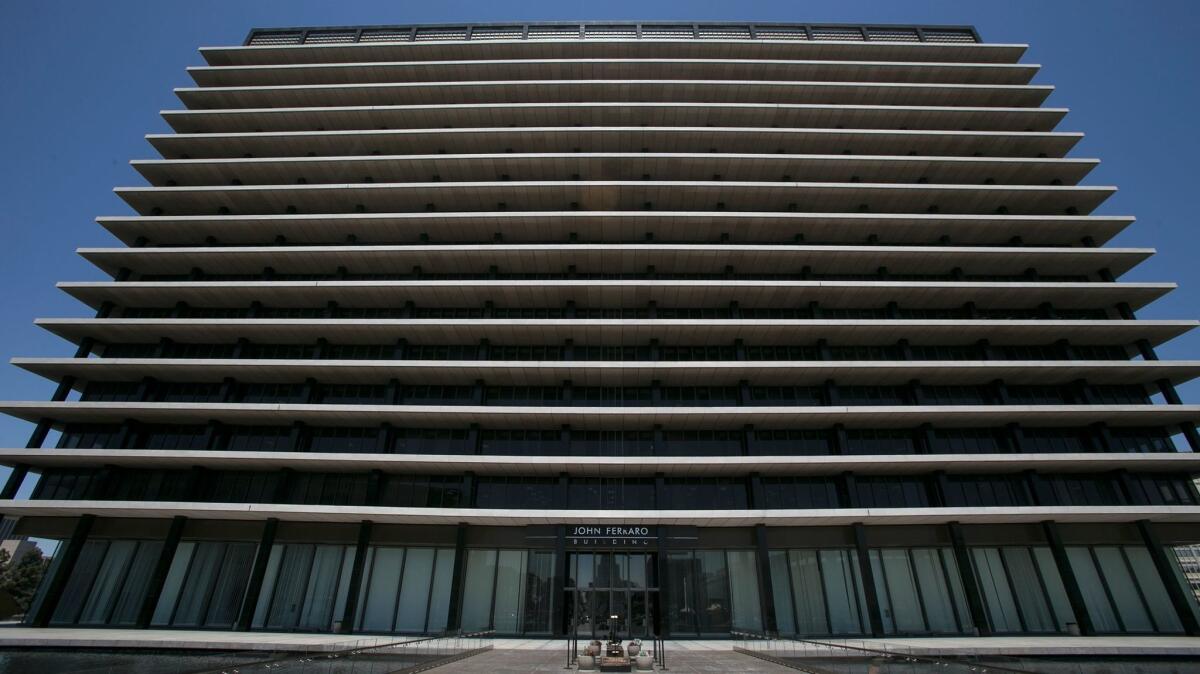L.A. City Council backs proposed settlement that could reduce DWP rate hikes

- Share via
The Los Angeles City Council backed a proposed legal settlement Wednesday that could reduce the electric bills of Department of Water and Power customers by hundreds of millions of dollars over the next four years.
The agreement, if approved by a judge, would resolve three lawsuits that took aim at the city’s long-standing practice of using 8% of the DWP’s yearly electricity revenue to balance the city budget.
The city’s general fund, which pays for police patrols, firefighters and other basic services, received about $267 million from the DWP in the 2015-16 fiscal year.
DWP critics had called the yearly payment an illegal tax increase. The utility sent the money in that same period, when the council voted to increase electricity rates by an average of nearly 3.9% a year.
Under the proposed settlement, the DWP would credit its customers for 8% of the money generated by a rate hike approved last year. The credit — which would be deducted from future DWP bills — would cover rate hike revenue collected during the 15-month period that ends June 30.
The city would put $52 million into a fund that would cover those credits, according to the settlement proposal. However, the final amount needed could change.
The settlement would also require the DWP to reduce by 8% rate hikes that were approved last year that would go into effect between July 1 and 2020, according to a city official familiar with the settlement agreement. That reduction could deliver hundreds of millions of dollars more, said the official, who was not authorized to speak publicly about the matter.
The settlement would also allow the city to dodge a major financial bullet.
Under the proposal, the DWP would continue to send its yearly payment to the general fund. However, the size of the payment would be lower — representing 8% of the power revenue collected by the utility under a rate ordinance approved in 2008.
That decreased payment is already reflected in Mayor Eric Garcetti’s budget for the upcoming fiscal year, which was signed last week. The mayor’s spending plan calls for the DWP to send $242.5 million to the general fund, a decrease of almost $25 million compared with two years ago.
Garcetti spokesman George Kivork declined to discuss details of the settlement, saying only that the mayor supports the council’s decision to move the proposal forward. But last month, Garcetti described the decrease in the DWP transfer as a major contributor to the city’s budget shortfall.
Under the settlement, city officials will be prohibited from increasing the percentage of the transfer. “That’s now a capped number,” Garcetti said during last month’s question-and-answer session on his budget plan.
The transfer currently represents about 4% of the city’s general fund revenue.
Attorneys for the plaintiffs in the three cases did not respond to requests from The Times for comment.
Opponents of the DWP transfer had argued that it violates Proposition 26, approved by state voters in 2010. Proposition 26 bars public utilities like the DWP from charging more for government services than it costs to provide them.
By transferring 8% of the DWP’s electricity revenue to the budget, the city was overcharging ratepayers 8%, opponents charged.
The transfer has grown in recent years, even as city leaders imposed higher costs on its customers. In March 2016, the council approved a five-year package of rate hikes that represented an average increase of 3.86% per year. DWP spokesman Joe Ramallo said the five-year package of rate increases will be smaller, thanks in part to lower-than-expected natural gas prices.
Vanessa Rodriguez, spokeswoman for City Council President Herb Wesson, confirmed that the council had put forth a settlement proposal but declined to discuss specifics.
Los Angeles is not the only city facing a challenge to its utility transfer. This year, a Superior Court judge ruled that Glendale transferred money from its electric utility to its general fund in violation of Proposition 26.
The judge ordered Glendale to repay its ratepayers nearly $57 million in power revenue. Lawyers for Glendale have filed an appeal.
Twitter: @DavidZahniser
More to Read
Sign up for Essential California
The most important California stories and recommendations in your inbox every morning.
You may occasionally receive promotional content from the Los Angeles Times.











